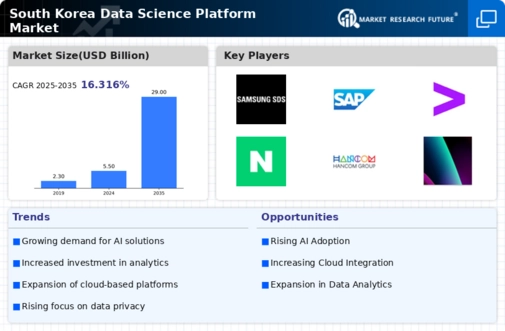The South Korea Data Science Platform Market is characterized by a rapidly evolving landscape driven by advancements in data analytics, artificial intelligence, and big data technologies. As organizations increasingly seek to leverage data for strategic decision-making and operational efficiencies, competition within this market has intensified. This competitive environment is marked by a diverse range of providers offering varying capabilities, from traditional data management solutions to more sophisticated platforms that integrate machine learning and predictive analytics.
The rise of digital transformation has further stimulated demand for robust data science platforms, prompting both established players and new entrants to innovate and expand their service offerings.
Companies are investing heavily in research and development to stay ahead in this dynamic market, focusing on areas such as real-time data processing and cloud-based solutions. As a result, the South Korean market presents numerous opportunities for players capable of addressing the unique needs of local businesses while navigating regulatory challenges and evolving consumer expectations.SK Telecom stands as a significant player in the South Korea Data Science Platform Market, leveraging its extensive telecommunications expertise to enhance its offerings. The company has made substantial investments in developing advanced analytics frameworks, facilitating seamless integration of data from vast communication networks.
A noteworthy strength of SK Telecom lies in its ability to harness in-depth customer insights through mobile data, which allows businesses to personalize services effectively. The company also actively collaborates with various industries, ranging from healthcare to finance, establishing a strong network that enhances its market presence. Furthermore, SK Telecom’s commitment to innovation is evident in its partnerships with academic institutions and tech startups, ensuring a continuous pipeline of new technologies and ideas that strengthen its position in the data science domain.
Samsung SDS plays a pivotal role in the South Korea Data Science Platform Market, providing a comprehensive suite of services that encompass data analytics, cloud solutions, and enterprise integration. The company is known for its leading-edge products, such as AI-based analytics platforms and big data solutions designed to optimize business processes for various sectors, including manufacturing, logistics, and finance. Samsung SDS has built a solid presence through its extensive portfolio of cloud-based services, enabling businesses to harness real-time insights and improve operational efficiency.
A key strength of Samsung SDS lies in its focus on merging advanced technology with industry-specific knowledge, facilitating tailored solutions for clients. The company's strategic mergers and acquisitions have further bolstered its capabilities, allowing it to integrate new technologies and expand its service offerings. Samsung SDS is recognized for its commitment to security and compliance, ensuring that its data science platforms meet the regulatory requirements crucial for businesses operating in the South Korean landscape.























